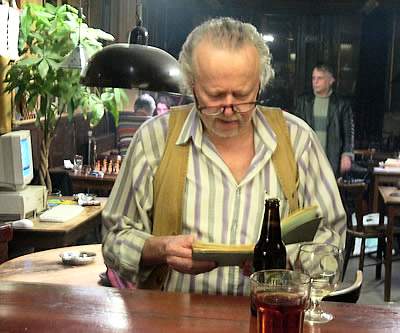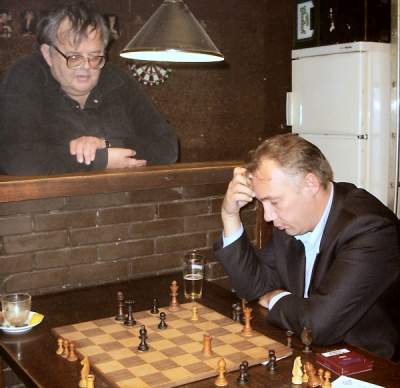


 The
New Year has started rather sadly for the chess community in the Netherlands.
Within a short period it lost four of its prominent and colourful figures.
Just before Christmas holiday FM Micha Leuw (36), the champion
of Caissa, the biggest club in Amsterdam, disappeared in a diving accident
in Thailand. Here is a search
that was launched for Micha at the end of December. Micha drowned on December
19, before the South Asia Tsunami struck.
The
New Year has started rather sadly for the chess community in the Netherlands.
Within a short period it lost four of its prominent and colourful figures.
Just before Christmas holiday FM Micha Leuw (36), the champion
of Caissa, the biggest club in Amsterdam, disappeared in a diving accident
in Thailand. Here is a search
that was launched for Micha at the end of December. Micha drowned on December
19, before the South Asia Tsunami struck.
The other three persons passed away in more natural, yet clearly premature, circumstances: Roy Dieks (48) was a huge youth talent in the seventies, who came second just to Miles in the world junior championship 1974 in Manila.
Rob Brunia (57) was a mythological chess trainer that accompanied many of the country’s top players in their first chess steps, and the co-inventor of the highly successful steps method (together with long live IM Cor van Vijgerden).

Menashe Goldberg (65, above), was the founder and the owner of the famous chess café Gambit in Amsterdam. Menashe came to Amsterdam as a tourist in 1967 from Tel-Aviv, fell in love with the city and chose to stay there for the rest of his life. He was a true chess lover and in 1981, he made up his mind to open a chess cafe at the ground floor of his house in Bloemgracht 20, in the very heart of the Jordaan, next to Anne Frank House.
The café has quickly become an attraction for chess enthusiasts, as well as for ordinary tourists from all over the world. Open daily from one o’clock until one o’clock, it served as a second home, often a main one, to generations of the game fans. You could also meet there occasionally some famous players as reflected in the photos hanging on the walls of this “brown café”. The background music is usually classic, preferably Chopin or Mozart suiting the boss taste, with some late night deviation to soft Rock or jazz to make it up for the faithful fellows behind the bar. Many chess couples owe the trigger to their romantic relations to the special atmosphere of the place and the neighborhood.

Yochanan Afek (standing) gives lessons in the Gambit Café
I knew Menashe for more than twenty years. He was not an easy person. His life-story turned him tough and often he found himself in the eye of a stormy argument, especially following a drink or two (or three). However, at the very same time he could be the most caring and helpful person and more than one lost chess soul (including yours truly) could often find a temporary shelter in his apartment at the top floor of the building. He was an active player himself, a regular in both Jersey and Guernsey, with a typical coffee house style, attacking the enemy king at any cost, much to the horror of the graduates of the strategical school. Nevertheless, he surprisingly had an enormous respect to the subtleties of the endgame study, always carrying in his back pocket a booklet with the best of Troitzky or Kubbel or Rinck, whose masterpieces he could study for long hours.
On January 13th, to the sounds of Frederic Chopin and Arik Einshtein, his Israeli favorite singer and schoolmate, Menashe was brought to the final station of his stormy life on the embankment of the river Amstel. Among the many friends and Gambit regulars that accompanied him for the last time, one could recognize several refugees of the tenacious fights ended in their kicking out of the establishment. They might have well still paid him sincere respect after all, or was it just to make sure that it was real and they can finally come back safely to their beloved Chess Café?